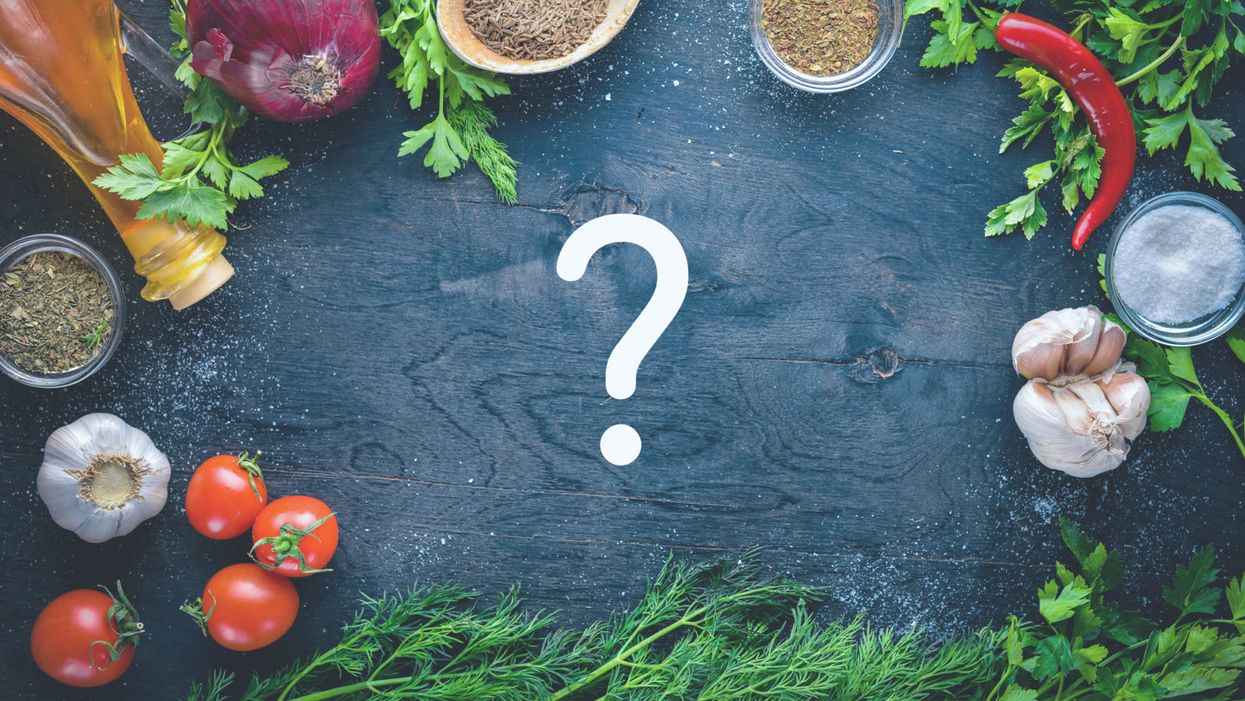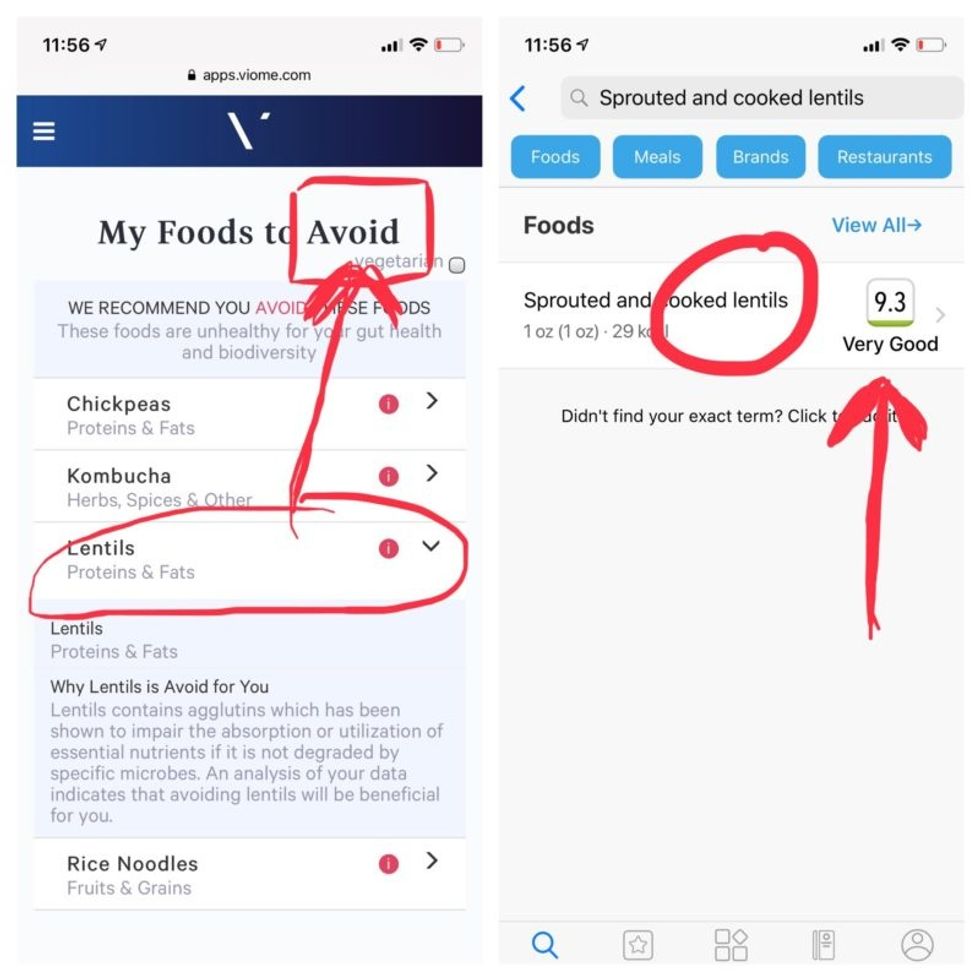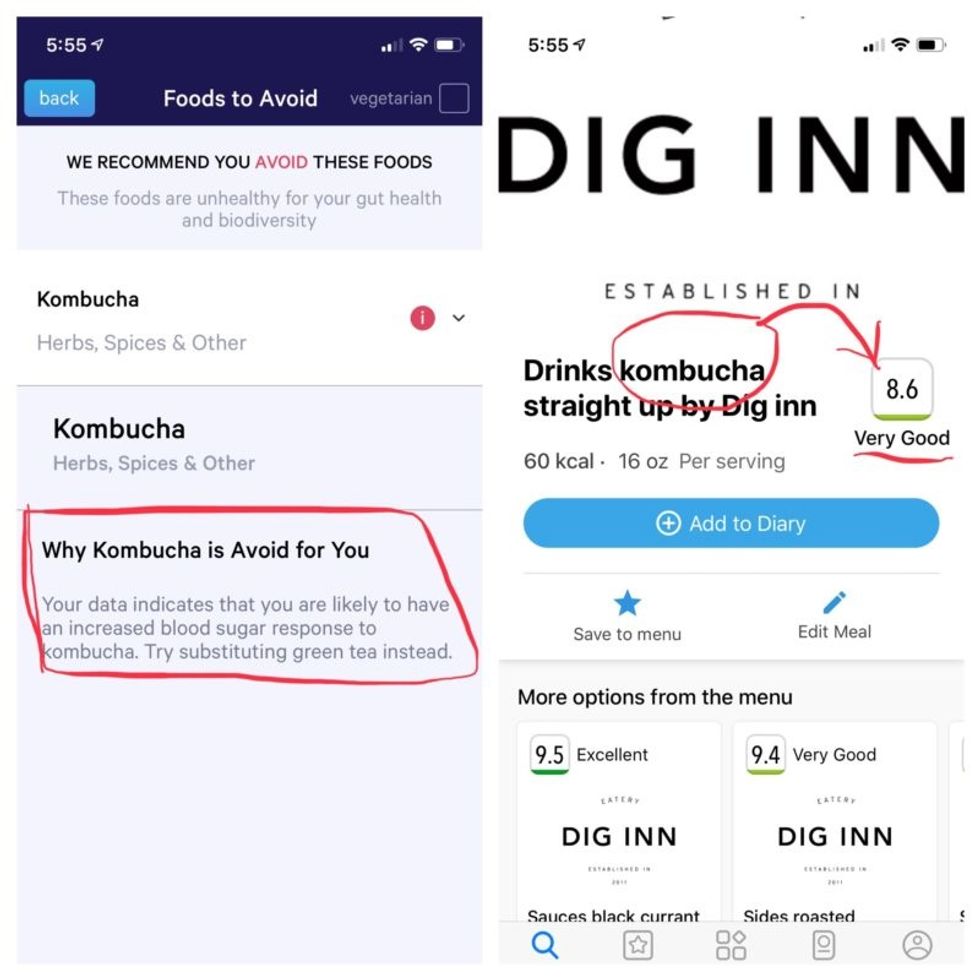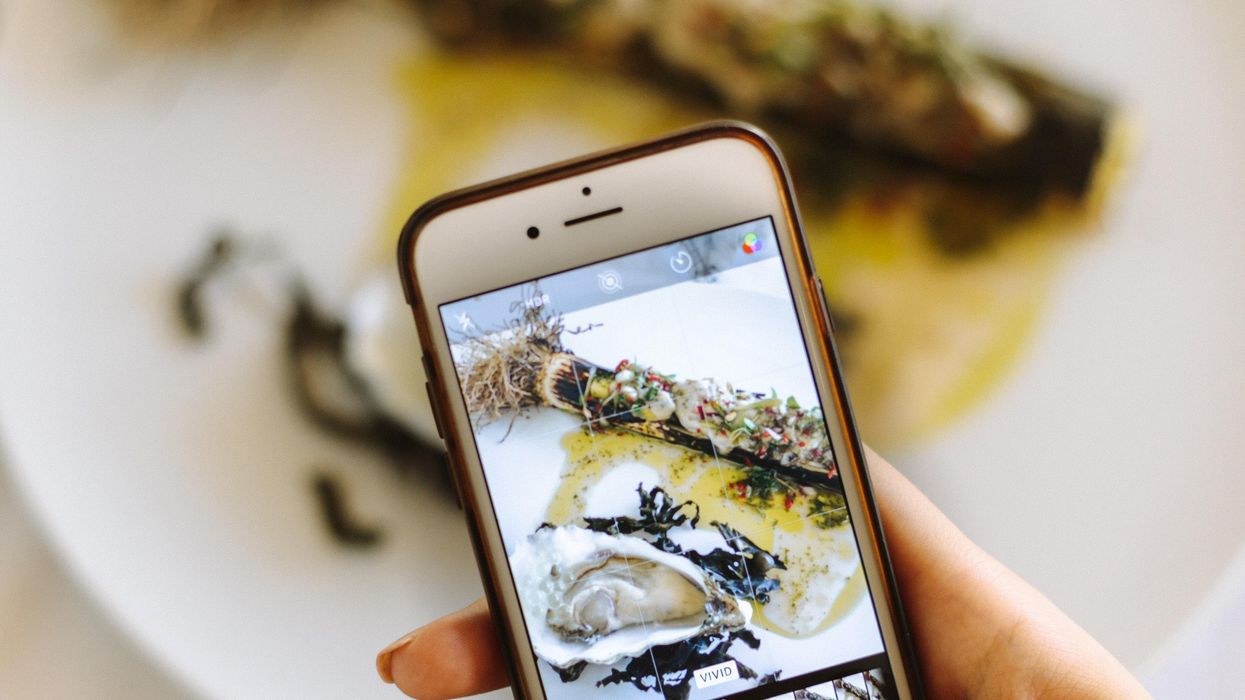Can You Trust Your Gut for Food Advice?
Kira Peikoff was the editor-in-chief of Leaps.org from 2017 to 2021. As a journalist, her work has appeared in The New York Times, Newsweek, Nautilus, Popular Mechanics, The New York Academy of Sciences, and other outlets. She is also the author of four suspense novels that explore controversial issues arising from scientific innovation: Living Proof, No Time to Die, Die Again Tomorrow, and Mother Knows Best. Peikoff holds a B.A. in Journalism from New York University and an M.S. in Bioethics from Columbia University. She lives in New Jersey with her husband and two young sons. Follow her on Twitter @KiraPeikoff.

Which foods are actually healthy for your individual gut microbiome? Several companies are offering personalized dietary guidance based on your test results, but their answers in one experiment turned up with some conflicting advice.
I recently got on the scale to weigh myself, thinking I've got to eat better. With so many trendy diets today claiming to improve health, from Keto to Paleo to Whole30, it can be confusing to figure out what we should and shouldn't eat for optimal nutrition.
A number of companies are now selling the concept of "personalized" nutrition based on the genetic makeup of your individual gut bugs.
My next thought was: I've got to lose a few pounds.
Consider a weird factoid: In addition to my fat, skin, bone and muscle, I'm carrying around two or three pounds of straight-up bacteria. Like you, I am the host to trillions of micro-organisms that live in my gut and are collectively known as my microbiome. An explosion of research has occurred in the last decade to try to understand exactly how these microbial populations, which are unique to each of us, may influence our overall health and potentially even our brains and behavior.
Lots of mysteries still remain, but it is established that these "bugs" are crucial to keeping our body running smoothly, performing functions like stimulating the immune system, synthesizing important vitamins, and aiding digestion. The field of microbiome science is evolving rapidly, and a number of companies are now selling the concept of "personalized" nutrition based on the genetic makeup of your individual gut bugs. The two leading players are Viome and DayTwo, but the landscape includes the newly launched startup Onegevity Health and others like Thryve, which offers customized probiotic supplements in addition to dietary recommendations.
The idea has immediate appeal – if science could tell you exactly what to make for lunch and what to avoid, you could forget about the fad diets and go with your own bespoke food pyramid. Wondering if the promise might be too good to be true, I decided to perform my own experiment.
Last fall, I sent the identical fecal sample to both Viome (I paid $425, but the price has since dropped to $299) and DayTwo ($349). A couple of months later, both reports finally arrived, and I eagerly opened each app to compare their recommendations.
First, I examined my results from Viome, which was founded in 2016 in Cupertino, Calif., and declares without irony on its website that "conflicting food advice is now obsolete."
I learned I have "average" metabolic fitness and "average" inflammatory activity in my gut, which are scores that the company defines based on a proprietary algorithm. But I have "low" microbial richness, with only 62 active species of bacteria identified in my sample, compared with the mean of 157 in their test population. I also received a list of the specific species in my gut, with names like Lactococcus and Romboutsia.
But none of it meant anything to me without actionable food advice, so I clicked through to the Recommendations page and found a list of My Superfoods (cranberry, garlic, kale, salmon, turmeric, watermelon, and bone broth) and My Foods to Avoid (chickpeas, kombucha, lentils, and rice noodles). There was also a searchable database of many foods that had been categorized for me, like "bell pepper; minimize" and "beef; enjoy."
"I just don't think sufficient data is yet available to make reliable personalized dietary recommendations based on one's microbiome."
Next, I looked at my results from DayTwo, which was founded in 2015 from research out of the Weizmann Institute of Science in Israel, and whose pitch to consumers is, "Blood sugar made easy. The algorithm diet personalized to you."
This app had some notable differences. There was no result about my metabolic fitness, microbial richness, or list of the species in my sample. There was also no list of superfoods or foods to avoid. Instead, the app encouraged me to build a meal by searching for foods in their database and combining them in beneficial ways for my blood sugar. Two slices of whole wheat bread received a score of 2.7 out of 10 ("Avoid"), but if combined with one cup of large curd cottage cheese, the score improved to 6.8 ("Limit"), and if I added two hard-boiled eggs, the score went up to 7.5 ("Good").
Perusing my list of foods with "Excellent" scores, I noticed some troubling conflicts with the other app. Lentils, which had been a no-no according to Viome, received high marks from DayTwo. Ditto for Kombucha. My purported superfood of cranberry received low marks. Almonds got an almost perfect score (9.7) while Viome told me to minimize them. I found similarly contradictory advice for foods I regularly eat, including navel oranges, peanuts, pork, and beets.

Contradictory dietary guidance that Kira Peikoff received from Viome (left) and DayTwo from an identical sample.
To be sure, there was some overlap. Both apps agreed on rice noodles (bad), chickpeas (bad), honey (bad), carrots (good), and avocado (good), among other foods.
But still, I was left scratching my head. Which set of recommendations should I trust, if either? And what did my results mean for the accuracy of this nascent field?
I called a couple of experts to find out.
"I have worked on the microbiome and nutrition for the last 20 years and I would be absolutely incapable of finding you evidence in the scientific literature that lentils have a detrimental effect based on the microbiome," said Dr. Jens Walter, an Associate Professor and chair for Nutrition, Microbes, and Gastrointestinal Health at the University of Alberta. "I just don't think sufficient data is yet available to make reliable personalized dietary recommendations based on one's microbiome. And even if they would have proprietary algorithms, at least one of them is not doing it right."
There is definite potential for personalized nutrition based on the microbiome, he said, but first, predictive models must be built and standardized, then linked to clinical endpoints, and tested in a large sample of healthy volunteers in order to enable extrapolations for the general population.
"It is mindboggling what you would need to do to make this work," he observed. "There are probably hundreds of relevant dietary compounds, then the microbiome has at least a hundred relevant species with a hundred or more relevant genes each, then you'd have to put all this together with relevant clinical outcomes. And there's a hundred-fold variation in that information between individuals."
However, Walter did acknowledge that the companies might be basing their algorithms on proprietary data that could potentially connect all the dots. I reached out to them to find out.
Amir Golan, the Chief Commercial Officer of DayTwo, told me, "It's important to emphasize this is a prediction, as the microbiome field is in a very early stage of research." But he added, "I believe we are the only company that has very solid science published in top journals and we can bring very actionable evidence and benefit to our uses."
He was referring to pioneering work out of the Weizmann Institute that was published in 2015 in the journal Cell, which logged the glycemic responses of 800 people in response to nearly 50,000 meals; adding information about the subjects' microbiomes enabled more accurate glycemic response predictions. Since then, Golan said, additional trials have been conducted, most recently with the Mayo Clinic, to duplicate the results, and other studies are ongoing whose results have not yet been published.
He also pointed out that the microbiome was merely one component that goes into building a client's profile, in addition to medical records, including blood glucose levels. (I provided my HbA1c levels, a measure of average blood sugar over the previous several months.)
"We are not saying we want to improve your gut microbiome. We provide a dynamic tool to help guide what you should eat to control your blood sugar and think about combinations," he said. "If you eat one thing, or with another, it will affect you in a different way."
Viome acknowledged that the two companies are taking very different approaches.
"DayTwo is primarily focused on the glycemic response," Naveen Jain, the CEO, told me. "If you can only eat butter for rest of your life, you will have no glycemic response but will probably die of a heart attack." He laughed. "Whereas we came from very different angle – what is happening inside the gut at a microbial level? When you eat food like spinach, how will that be metabolized in the gut? Will it produce the nutrients you need or cause inflammation?"
He said his team studied 1000 people who were on continuous glucose monitoring and fed them 45,000 meals, then built a proprietary data prediction model, looking at which microbes existed and how they actively broke down the food.
Jain pointed out that DayTwo sequences the DNA of the microbes, while Viome sequences the RNA – the active expression of DNA. That difference, in his opinion, is key to making accurate predictions.
"DNA is extremely stable, so when you eat any food and measure the DNA [in a fecal sample], you get all these false positives--you get DNA from plant food and meat, and you have no idea if those organisms are dead and simply transient, or actually exist. With RNA, you see what is actually alive in the gut."

More contradictory food advice from Viome (left) and DayTwo.
Note that controversy exists over how it is possible with a fecal sample to effectively measure RNA, which degrades within minutes, though Jain said that his company has the technology to keep RNA stable for fourteen days.
Viome's approach, Jain maintains, is 90 percent accurate, based on as-yet unpublished data; a patent was filed just last week. DayTwo's approach is 66 percent accurate according to the latest published research.
Natasha Haskey, a registered dietician and doctoral student conducting research in the field of microbiome science and nutrition, is skeptical of both companies. "We can make broad statements, like eat more fruits and vegetables and fiber, but when it comes to specific foods, the science is just not there yet," she said. "I think there is a future, and we will be doing that someday, but not yet. Maybe we will be closer in ten years."
Professor Walter wholeheartedly agrees with Haskey, and suggested that if people want to eat a gut-healthy diet, they should focus on beneficial oils, fruits and vegetables, fish, a variety of whole grains, poultry and beans, and limit red meat and cheese, as well as avoid processed meats.
"These services are far over the tips of their science skis," Arthur Caplan, the founding head of New York University's Division of Medical Ethics, said in an email. "We simply don't know enough about the gut microbiome, its fluctuations and variability from person to person to support general [direct-to-consumer] testing. This is simply premature. We need standards for accuracy, specificity, and sensitivity, plus mandatory competent counseling for all such testing. They don't exist. Neither should DTC testing—yet."
Meanwhile, it's time for lunch. I close out my Viome and DayTwo apps and head to the kitchen to prepare a peanut butter sandwich. My gut tells me I'll be just fine.
Kira Peikoff was the editor-in-chief of Leaps.org from 2017 to 2021. As a journalist, her work has appeared in The New York Times, Newsweek, Nautilus, Popular Mechanics, The New York Academy of Sciences, and other outlets. She is also the author of four suspense novels that explore controversial issues arising from scientific innovation: Living Proof, No Time to Die, Die Again Tomorrow, and Mother Knows Best. Peikoff holds a B.A. in Journalism from New York University and an M.S. in Bioethics from Columbia University. She lives in New Jersey with her husband and two young sons. Follow her on Twitter @KiraPeikoff.
Podcast: The Friday Five weekly roundup in health research
Scientists have designed a phone app that could alert consumers to high levels of cancer-causing chemicals, Yale researchers revive organs in dead pigs, and more in this week's Friday Five.
The Friday Five covers five stories in health research that you may have missed this week. There are plenty of controversies and troubling ethical issues in science – and we get into many of them in our online magazine – but this news roundup focuses on scientific creativity and progress to give you a therapeutic dose of inspiration headed into the weekend.
Listen to the Episode
Listen on Apple | Listen on Spotify | Listen on Stitcher | Listen on Amazon | Listen on Google
Covered in this week's Friday Five:
- A new blood test for cancer
- Patches of bacteria can use your sweat to power electronic devices
- Researchers revive organs of dead pigs
- Phone apps detects cancer-causing chemicals in foods
- Stem cells generate "synthetic placentas" in mice
Plus, an honorable mention for early research involving vitamin K and Alzheimer's
The limits of digital privacy are becoming clearer in the post-Dobbs era, as a wide range of data sources can reveal online and offline activities, including whether a woman seeks an abortion.
Since the recent reversal of Roe v. Wade — the landmark decision establishing a constitutional right to abortion — the vulnerabilities of reproductive health data and various other information stored on digital devices or shared through the Web have risen to the forefront.
Menstrual period tracking apps are an example of how technologies that collect information from users could be weaponized against abortions seekers. The apps, which help tens of millions of users in the U.S. predict when they’re ovulating, may provide evidence that leads to criminal prosecution in states with abortion bans, says Anton T. Dahbura, executive director of the Johns Hopkins University Information Security Institute. In states where abortion is outlawed, “it’s probably best to not use a period tracker,” he says.
Following the Dobbs v. Jackson ruling in late June that overturned Roe, even women who suffered a miscarriage could be suspected of having an abortion in some cases. While using these apps in anonymous mode may appear more secure, “data is notoriously difficult to perfectly anonymize,” Dahbura says. “Whether the data are stored on the user’s device or in the cloud, there are ways to connect that data to the user.”
Completely concealing one’s tracks in cyberspace poses enormous challenges. Digital forensics can take advantage of technology such as GPS apps, security cameras, license plate trackers, credit card transactions and bank records to reconstruct a person’s activities,” Dahbura says. “Abortion service providers are also in a world of risk for similar reasons.”
Practicing “good cyber hygiene” is essential. That’s particularly true in states where private citizens may be rewarded for reporting on women they suspect of having an abortion, such as Texas, which passed a so-called bounty hunter law last fall. To help guard against hacking, Dahbura suggests using strong passwords and two-factor authentication when possible while remaining on alert for phishing scams on email or texts.
Another option for safeguarding privacy is to avoid such apps entirely, but that choice will depend on an individual’s analysis of the risks and benefits, says Leah Fowler, research assistant professor at the University of Houston Law Center, Health Law & Policy Institute.
“These apps are popular because people find them helpful and convenient, so I hesitate to tell anyone to get rid of something they like without more concrete evidence of its nefarious uses,” she says. “I also hate the idea that asking anyone capable of becoming pregnant to opt out of all or part of the digital economy could ever be a viable solution. That’s an enormous policy failure. We have to do better than that.”
The potential universe of abortion-relevant data can include information from a variety of fitness and other biometric trackers, text and social media chat records, call details, purchase histories and medical insurance records.
Instead, Fowler recommends that concerned consumers read the terms of service and privacy policies of the apps they’re using. If some of the terms are unclear, she suggests emailing customer service with questions until the answers are satisfactory. It’s also wise for consumers to research products that meet their specific needs and find out whether other women have raised concerns about specific apps. Users interested in more privacy may want to switch to an app that stores data locally, meaning the data stays on your device, or does not use third-party tracking, so the app-maker is the only company with access to it, she says.
Period tracking apps can be useful for those on fertility journeys, making it easier to store information digitally than on paper charts. But users may want to factor in whether they live in a state with an anti-abortion stance and run the risk of legal issues due to a potential data breach, says Carmel Shachar, executive director of the Petrie-Flom Center for Health Law Policy, Biotechnology, and Bioethics at Harvard Law School.
Consumers’ risks extend beyond period tracking apps in the post-Roe v. Wade era. “Anything that creates digital breadcrumbs to your reproductive choices and conduct could raise concerns — for example, googling ‘abortion providers near me’ or texting your best friend that you are pregnant but do not want to be,” Shachar says. Women also could incriminate themselves by bringing their phones, which may record geolocation data, to the clinic with them.
The potential universe of abortion-relevant data can include information from a variety of fitness and other biometric trackers, text and social media chat records, call details, purchase histories and medical insurance records, says Rebecca Wexler, faculty co-director of the Berkeley Center for Law & Technology. “These data sources can reveal a pregnant person’s decision to seek or obtain an abortion, as well as reveal a healthcare provider’s provision of abortion services and anyone else’s provision of abortion assistance,” she says.
In some situations, people or companies could inadvertently expose themselves to risk after posting on social media with offers of places for abortion seekers to stay after traveling from states with bans. They could be liable for aiding and abetting abortion. At this point, it’s unclear whether states that ban abortion will try to prosecute residents who seek abortions in other states without bans.
Another possibility is that a woman seeking an abortion will be prosecuted based not only on her phone’s data, but also on the data that law enforcement finds on someone else’s device or a shared computer. As a result, “people in one household may find themselves at odds with each other,” says K Royal, faculty fellow at the Center for Law, Science, and Innovation at Arizona State University’s Sandra Day O'Connor College of Law. “This is a very delicate situation.”
Individuals and corporate executives should research their options before leaving a digital footprint. “Guard your privacy carefully, whether you are seeking help or you are seeking to help someone,” Royal says. While she has come across recommendations from other experts who suggest carrying a second phone that is harder to link a person’s identity for certain online activities, “it’s not practical on a general basis.”
The privacy of this health data isn’t fully protected by the law because period trackers, texting services and other apps are not healthcare providers — and as a result, there’s no prohibition on sharing the information with a third party under the Health Insurance Portability and Accountability Act of 1996, says Florencia Marotta-Wurgler, a professor who specializes in online consumer contracts and data privacy at the NYU School of Law.
“So, as long as there is valid consent, then it’s fair game unless you say that it violates the reasonable expectations of consumers,” she says. “But this is pretty unchartered territory at the moment.”
As states implement laws granting anyone the power to report suspected or known pregnancies to law enforcement, anti-choice activists are purchasing reproductive health data from companies that make period apps, says Rebecca Herold, chief executive officer of Privacy & Security Brainiacs in Des Moines, Iowa, and a member of the Emerging Trends Working Group at ISACA, an association focused on information technology governance. They could also buy data on search histories and make it available in places like Texas for “bounty hunters” to find out which women have searched for information about abortions.
Some groups are creating their own apps described as providing general medical information on subjects such as pregnancy health. But they are “ultimately intended to ‘catch’ women” — to identify those who are probably pregnant and dissuade them from having an abortion, to launch harassment campaigns against them, or to report them to law enforcement, anti-choice groups and others in states where such prenatal medical care procedures are now restricted or prohibited, Herold says.
In addition to privacy concerns, the reversal of Roe v. Wade raises censorship issues. Facebook and Instagram have started to remove or flag content, particularly as it relates to providing the abortion pill, says Michael Kleinman, director of the Silicon Valley Initiative at Amnesty International USA, a global organization that promotes human rights.
Facebook and Instagram have rules that forbid private citizens from buying, selling or giving away pharmaceuticals, including the abortion pill, according to a social media post by a communications director for Meta, which owns both platforms. In the same post, though, the Meta official noted that the company’s enforcement of this rule has been “incorrect” in some cases.
“It’s terrifying to think that arbitrary decisions by these platforms can dramatically limit the ability of people to access critical reproductive rights information,” Kleinman says. However, he adds, “as it currently stands, the platforms make unilateral decisions about what reproductive rights information they allow and what information they take down.”

